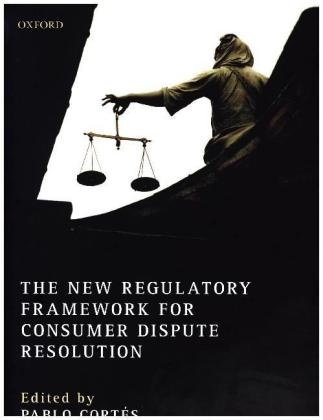Read more
Consumer out-of-court redress in the European Union is experiencing a significant transformation; indeed the current changes are the most important that have occurred in the history of the EU. This is due to the recent implementation of the Alternative Dispute Resolution (ADR) Directive 2013/11/EU and the Online Dispute Resolution (ODR) Regulation (EU) 2013/524. The Directive ensures the availability of quality ADR schemes and sets information obligations on businesses, and the Regulation enables the resolution of consumer disputes through a pan European ODR platform.
The New Regulatory Framework for Consumer Dispute Resolution examines the impact of the new EU law in the field of consumer redress. Part I of the volume examines the new European legal framework and the main methods of consumer redress, including mediation, arbitration, and ombudsman schemes. Part II analyses the implementation of the ADR Directive in nine Member States with very different legal cultures in consumer redress, namely: Belgium, Ireland, Italy, Germany, France, Portugal, Spain, the Netherlands and the UK, as well as the distinct approach taken in the US. Part III evaluates new trends in consumer ADR (CDR) by identifying best practices and looking at future trends in the field. In particular, it offers a vision of the future of CDR which is more than a mere dispute resolution tool, it poses a model on dispute system design for CDR, it examines the challenges of cross-border disputes, it proposes a strategy to promote mediation, and it identifies good practices of CDR and collective redress. The book concludes by calling for the mandatory participation of traders in CDR.
List of contents
- Introduction
- Part I
- 1: PABLO CORTÉS: The New Landscape of Consumer Redress: The European Directive on Consumer Alternative Dispute Resolution and the Regulation on Online Dispute Resolution
- 2: PABLO CORTÉS and RAFAL MANKO: Developments in European Civil Procedures
- 3: PABLO CORTÉS: The Consumer Arbitration Conundrum: A Matter of Statutory Interpretation or Time for Reform?
- 4: SUE PRINCE: Access to court? "Encouraging" consumers to use court-connected mediation in small claims and other cases
- 5: NAOMI CREUTZFELDT: Ombudsman Schemes - Energy Sector in Germany, France, and the UK
- 6: STEFAAN VOET: The Implementation of the Consumer ADR Directive in Belgium
- 7: EMMANUEL GUINCHARD: The Implementation of the Consumer ADR Directive in France
- 8: ROSA MIQUEL: The Implementation of the Consumer ADR Directive in Germany
- 9: BRIAN HUTCHINSON: The Implementation of the Consumer ADR Directive and the ODR Regulation in Ireland
- 10: CARLO PILIA, PABLO CORTÉS, PAOLO VARGIU: The Implementation of the Consumer ADR Directive in Italy
- 11: ELINE VERHAGE: The Implementation of the Consumer ADR Directive in the Netherlands
- 12: CÁTIA MARQUES CEBOLA: The Implementation of the Consumer ADR Directive in Portugal: The Necessary Reform or Missed Opportunity?
- 13: FERNANDO ESTEBAN DE LA ROSA: Challenges for the Implementation of the Consumer ADR Directive in Spain
- 14: RICHARD KIRKHAM: Regulating ADR: Lessons from the UK
- 15: AMY J. SCHMITZ: Consumer Redress in the United States
- 16: CHRISTOPHER HODGES: Consumer Redress: Implementing the Vision
- 17: JANE WILLIAMS AND CHRIS GILL: A Dispute System Design Perspective on the Future Development of Consumer Dispute Resolution
- 18: GUILLERMO PALAO MORENO: "Cross-border Consumer Redress after the ADR Directive and the ODR Regulation"
- 19: GIUSEPPE DE PALO AND ROMINA CANESSA: New Trends of ADR in the European Union
- 20: COSMO GRAHAM: Consumer ADR and Collective Redress
- Conclusion
About the author
Pablo Cortés is Chair in Civil Justice at the University of Leicester. He conducts research in the field of consumer law, civil procedure, ADR, and ODR. He has advised the European Commission during the drafting of the ODR Regulation and ADR Directive and has been invited to write reports and to participate in expert meetings by the UN Commission on International Trade Law (UNCITRAL Working Group-III ODR), the European Commission Directorate-General for Health & Consumers (DG SANCO) and Justice (DG JUST) as well as by the European Parliament Internal Market and Consumer Protection Committee (IMCO), and the Legal Affairs Committee (JURI). Pablo serves on the advisory board of NetNeutrals and Youstice. He is a fellow of the National Centre for Technology and Dispute Resolutions (University of Massachusetts, Amherst) and in 2012 he was a Gould Research Fellow at Stanford University.
Summary
This book examines the impact of the new EU law in the field of consumer redress. It explores the new European legal framework and the main methods of consumer redress, analyses the implementation of the ADR Directive in various Member States, and evaluates new trends in consumer ADR.
Additional text
...Arbitrators, mediators and yes, lawyers will find this book not only an absorbing and enlightening read, but a useful and certainly voluminous source of references for further research.
Report
...Arbitrators, mediators and yes, lawyers will find this book not only an absorbing and enlightening read, but a useful and certainly voluminous source of references for further research. Phillip Taylor MBE and Elizabeth Taylor, Richmond Green Chambers

